Bringing home a newborn baby can be a wonderful feeling, but sometimes it can create tension between the baby and the former baby of the house, your furry little friend.
Some dogs are naturally protective over newborn babies. Others are fascinated, and some are downright jealous and aggressive.
It’s important to fully understand how dogs and babies interact, how to introduce babies and dogs, and more to make sure that your baby is safe.
How To Safely Introduce A Dog To A Newborn
It can be tempting to instantly introduce your two loves, but dogs and babies don’t always mesh well together. Because of this, it’s important to take things slowly, and prepare before the birth of the baby if possible.
Separate Them
Babies won’t mind the dog, but dogs might mind the baby. This is why it’s safer to take things slowly. For the first few days, keep them separated.
If possible, baby gate off certain rooms of the house to keep babies and dogs apart. This will give him time to adjust to a new baby being in the house.
He’ll also need to get used to crying, and to the smell of a baby. This can be intriguing for some dogs, but stressful for others. Try to keep them apart for approximately 2-3 days, if possible.
Plan for this and pick up some baby gates well before the due date to make sure that you’re prepared.
- EXTRA WIDE: Expands to fit openings between 29-38 and 42-47 inches wide. Stands 30 inches tall. Please be sure measure your opening prior to purchase to ensure proper fit
- EASY TO USE AND SET UP: Pressure mount design that is quick to set up. Please note, before installation there will be a gap between the gate latch and the frame which is NOT a defect and it is NOT bent. This gap will be eliminated once installed.
- ADJUSTABLE: Includes a 4-inch wide and 12-inch wide extension kit and 4 pressure mount spindle rods. Perfect for doorway, hallway and bottom of stair use. Gate can quickly be removed out of the opening for easy storage. Additional extensions sold separately.
Prices pulled from the Amazon Product Advertising API on:
Product prices and availability are accurate as of the date/time indicated and are subject to change. Any price and availability information displayed on [relevant Amazon Site(s), as applicable] at the time of purchase will apply to the purchase of this product.
Say Hi To The Dog Alone
Walking in from being gone for a few days while giving birth is bound to excite your furry friend. You don’t want him to scare the baby with barking, and you don’t the dog to jump on the baby either.
Instead, walk in the house alone if possible. If not, put the dog in the other room. Then, bring the baby inside, and put them in their nursery for a bit.
After the baby is in the other room, let the dog out so that you can say hi to them and spend a little bit of quality time together. After this, continue to keep them separated for a few days.
Wait Until The Dog Would Like To Approach The Baby
It can be easier to try to do this on your own schedule, but forcing a dog to approach a baby can make them anxious and aggressive. Instead, simply let them be in the same room together.
Then, wait until the dog shows interest in the baby. It’s important to let your four-legged friend do this on their own time.
Take Precautions
Prices pulled from the Amazon Product Advertising API on:
Product prices and availability are accurate as of the date/time indicated and are subject to change. Any price and availability information displayed on [relevant Amazon Site(s), as applicable] at the time of purchase will apply to the purchase of this product.
Different dogs will feel differently about babies. One dog might feel aggressive while another one might feel scared. This is why it’s essential to take precautions.
First, learn what your dog is saying to you. You can usually tell how they feel by looking at their tail, ears, and body language. It’s also important to put the dog on a leash while they get to know the new baby.
Making sure that they keep a safe distance while sniffing the baby will help prevent aggression, and jumping from excitement. While holding the leash, ensure that there isn’t enough slack for the dog to jump on the baby, or walk on the baby.
If possible, try to stay in between the dog and the baby. You should be in the middle. This will help you get to the dog quicker if things turn out badly.
If you’re busy, have another adult in the house sit in between the dog and the baby. It’s always better to be safe instead of sorry.
Let The Dog Get Used To Various Baby Things
It’s critical to supervise the dog as they adjust to the baby. A dog can easily misinterpret the babies crying or movements as an invitation to play. When a baby kicks, the dog may nip at their legs.
Make Sure The Dog Gets Plenty Of Attention
During the introduction and after the introduction, make sure that your dog gets plenty of love. It’s impossible to give your dog too much attention at this point.
Give them encouragement and positive reinforcement during the introduction while the baby is taking a nap to maintain that same attitude.
Play with them when the baby is around, but also when the little one is out of the room. If you only pay attention to the dog when the baby is napping, it’ll give your pet the impression that the baby is a problem, which can lead to jealous behaviors.
Why Do Dogs Love Or Like Babies?
Dogs and babies actually have more in common than we realize. Both of them get a lot of joy out of the world, even through simple things that most of us overlook, such as a flower or the grass.
They’re in constant awe of the things around them and amazed at what we consider everyday life. This can help foster a connection between the two. It’s not the only reason that dogs love babies, though.
Babies Smell Good
Babies are known for having that sweet baby smell that we associate them with. This goes over surprisingly well with dogs, who learn a lot about the world around them through their sense of smell.
When things or people smell pleasant to a dog, they are more likely to enjoy them. When they do not, they will turn their nose away, both literally and figuratively.
They Both Need A Lot Of Attention
View in gallery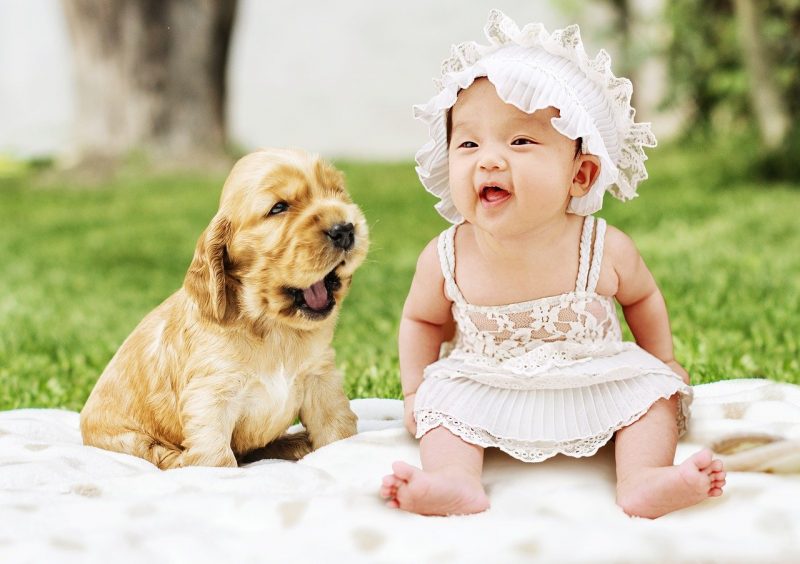
Both babies and dogs require a lot of attention and affection. Because of this, the two go hand in hand. As babies grow older, they are more mobile and able to give dogs the attention that they crave.
Likewise, dogs don’t have the responsibilities of parents, so they are always available to give babies attention.
They Are Part Of The Family
As a family, you are also your dog’s personal pack. Dogs look at you, and your baby, as part of their own family as well.
To some dogs, you bringing home a new baby is the equivalent of another member of the pack having a puppy. This can result in them feeling loving or protective of the new baby.
Why Are Some Dogs Protective Over Babies?
Dogs are known as what is called a pack animal. It means that they run in packs, such as wild wolves. In the domesticated world, the family and owners are the dog’s pack, which includes the new baby.
Because of this, the dog might instantly be attracted to the new baby, and develop a certain amount of fondness for it while protecting it.
Parenting Ability
View in gallery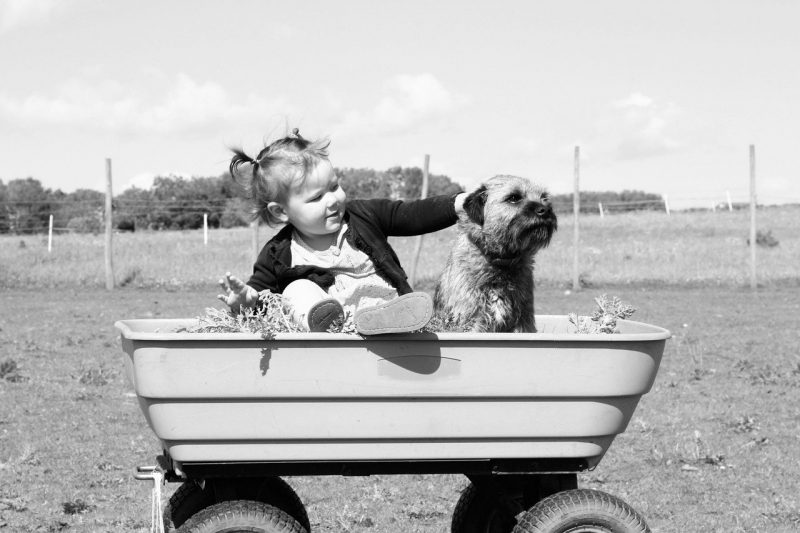
When a dog feels protective over a baby, it could be because babies are so harmless and defenseless that it brings out a dog’s parenting ability, just like being around a puppy that needs help will.
Dogs are naturally protective over their offspring, which spills over into the way that they act around babies.
If you notice your dog licking your baby, especially when they cry, it’s because they are parenting them. This is how they are checking to make sure that the baby is okay.
Do Dogs Know What Babies Are And To Be Gentle With Them?
Dogs might not know what babies are in the sense of where they come from or that we call them babies, but dogs do have an understanding of babies that is their own.
Dogs in general have a surprisingly high emotional IQ when compared to other animals. They also have an intuition that some humans should be jealous of.
Have you ever heard that a dog can sense a bad person, and won’t go near them or will bark profusely in their presence? This is thanks to their intuition.
Just like dogs can sense other things, dogs can sense that babies are both harmless and defenseless. Because of this, some dogs instantly know to be gentle with babies, but it does vary depending on the dog.
Signs Dog Is Jealous Of Baby
Dogs can get jealous of babies just like siblings can. They might not know how to act around a new baby, or not understand what is expected of them.
Dogs could also be jealous of the attention that the new baby is getting. Over time, jealousy can breed resentment if it is not addressed.
Some behaviors, such as aggression, can be mistaken for jealousy, though. This is why it’s important to make sure that your dog is, in fact, jealous of the new baby.
Watch out for these signs your dog is jealous of the new baby to make sure that you take care of the problem sooner rather than later:
- Guarding valuable things. This is more than likely your dog’s favorite anything. It could be a toy, rug, area of the room they typically sleep in, etc. They won’t want the baby to touch their most prized possessions.
- Aggression
- Attention seeking behavior. Your dog may start jumping on you, barking, chewing your shoes to pieces, or anything else that gets them more attention.
- Going to the bathroom inside instead of barking to be let out
- Misbehavior
- Randomly doing tricks when not prompted. This is because your dog is trying to get your attention
- Growling
What To Do If Your Dog Is Jealous Of The New Baby
If you’re sure that your dog is jealous of the new baby, it’s important to remedy the situation as soon as possible. As jealous behaviors get worse, some dogs will begin to get aggressive, which can put your little one in danger.
View in gallery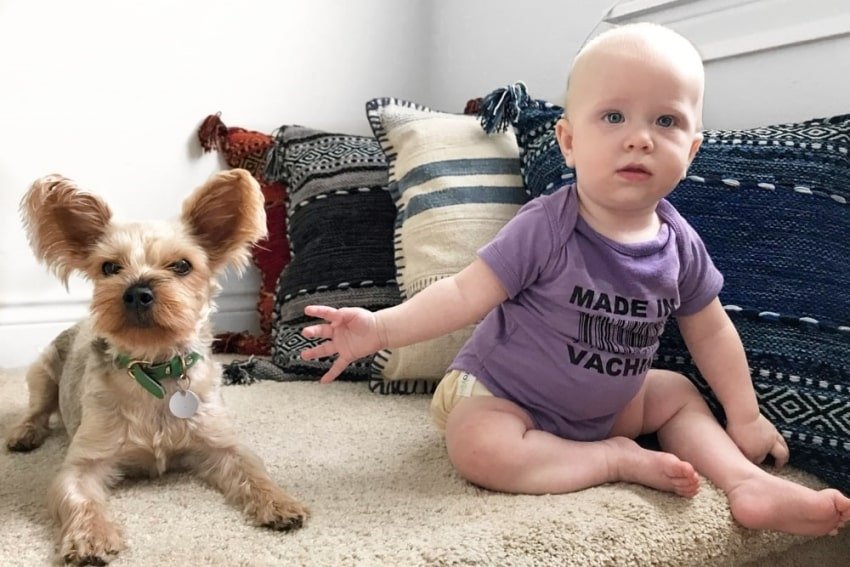
Don’t forget to not leave the baby and the dog alone together in the meantime. These ideas will help you both formulate a complete plan to address jealousy, and curb jealous behaviors.
Let Your Dog Guard Its Things
If you see your dog guarding valuable things, don’t try to curb this behavior. It can be tempting to make them share in order to encourage cooperation, but this will actually backfire.
Instead, it will make your dog madder than they already are. This behavior will naturally dissipate as your dog stops feeling jealous.
Immediately Correct Aggression And Misbehavior
Aggressive behavior and any type of misbehavior, such as urinating indoors, should be immediately corrected. While this does give the dog attention, ignoring the behavior sends the message that it is now acceptable behavior.
It will be much more difficult to curb later on if you let it go. This should be done simultaneously with other methods of handling jealous behaviors in dogs.
Give Them Extra Love
When dogs are acting their worst, it’s because they need more love than ever before. Your pet might feel like the baby is taking their place, and they might not feel secure in the family.
This can instantly lead to jealous behaviors in dogs. Make sure that you set aside special time with your dog without the baby. Go for walks, or play catch while your little one is resting.
They will need plenty of attention as they adjust to having a new member of the family.
Give Them Personal Space
Your dog might feel jealous, depressed, or a bit like sulking after you bring the baby home. While they’re adjusting, they might need some time to themselves.
Give them their own personal space to enjoy in the meantime. This could be a portion of the room with all of their toys and their favorite blanket. It could also be a separate room in the house that they can have all to themselves.
What If Your Dog Is Anxious Or Aggressive Towards Baby?
View in gallery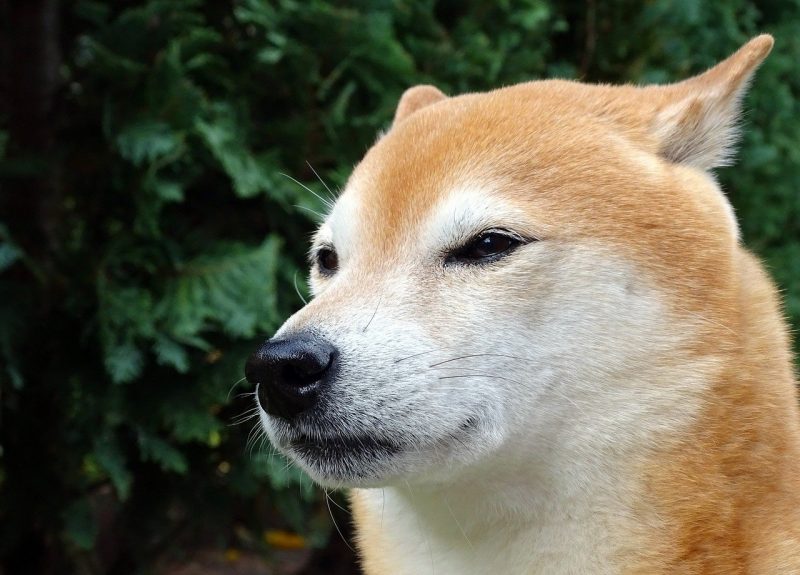
When your dog is feeling anxious or aggressive towards the baby, it’s important to understand where this behavior is coming from.
Often, these issues arise from underlying feelings that your dog is unable to express otherwise. When dogs display anxious or aggressive behaviors, they are trying to tell you something.
Make Sure It’s Not Jealousy
Aggression is one of the primary signs that a dog is feeling jealous. Look at the above signs to determine this one.
The more signs your dog shows of being jealous, the more likely it is that they are actually jealous of the new baby. If they are, follow the tips above to make sure that you can curb those feelings as soon as possible.
Give Them Some Time
Dogs might seem anxious near a baby if they have never been around a baby before. This alone can make them anxious because they do not know how to act.
After you have introduced your dog to the new baby, make sure to correct behavior, and to pet them when they display appropriate behavior. Positive and negative reinforcement will help mold how they act towards the baby, slowly easing their anxiety.
Document Behavior
If your dog appears aggressive towards the baby, make sure to take measures to curb jealous behavior. Documenting behavior in your dog can be a helpful tool during this process.
This can signal if there are certain triggers for your dog, such as when the baby cries. It’s common for dogs to feel anxious when infants cry if they have never been exposed to this noise before.
As you document behavior, keep an eye out for specific patterns that your dog might be displayed. Then, you can address the underlying issue. Dogs are often aggressive towards babies because they are jealous or they are uncomfortable.
Prices pulled from the Amazon Product Advertising API on:
Product prices and availability are accurate as of the date/time indicated and are subject to change. Any price and availability information displayed on [relevant Amazon Site(s), as applicable] at the time of purchase will apply to the purchase of this product.
Is Your Dog Depressed After Bringing Home A Newborn?
View in gallery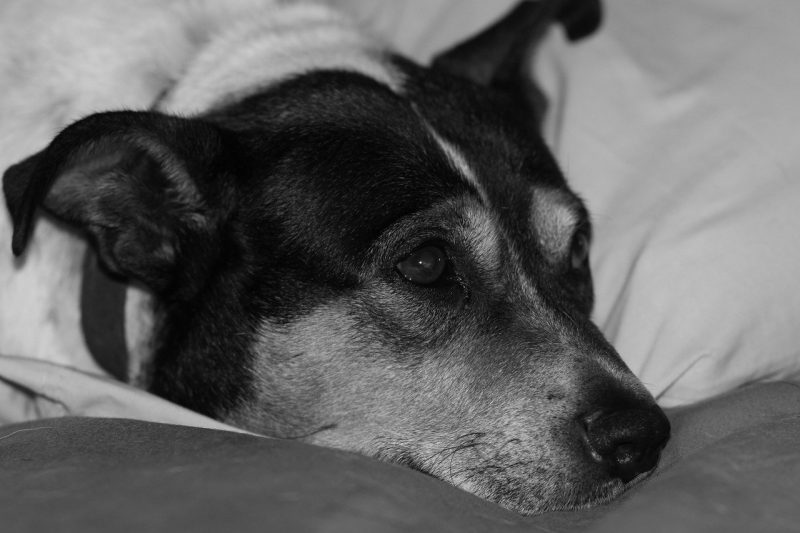
It’s extremely common for a dog to become depressed after you bring home a new baby. Drastic changes, such as moving or a new baby, are known for making dogs depressed.
They might miss you while you are away at the hospital, too. Last, they might not get as much attention as before. This can lead to attention-seeking behavior, and eventually depression.
Signs Of Depression In Dogs
Your dog might be depressed, or they could be sulking because they are mad. Before taking steps to help your dog with depression, it’s important to make sure that depression is indeed what is going on.
These are some of the most common signs of depression to watch out for:
- Change in eating patterns (usually eat less)
- Change in sleeping patterns
- Withdrawn (you might notice your dog hiding and refusing to come out, for example)
- No longer enjoys activities that they previously enjoyed (car rides, going to the dog park, going for walks)
- Might not drink as much as they used to
If your dog is experiencing these symptoms, it’s important that they see a veterinarian. While these are symptoms of depression, they can also be symptoms of an underlying medical condition.
Causes Of Depression In Dogs
View in gallery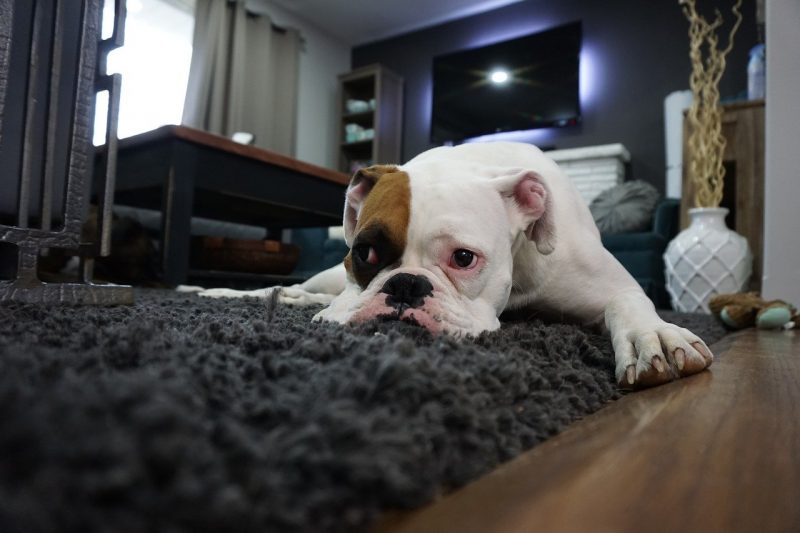
If you just brought home a new baby, that significant life change can be enough to cause depression in dogs. It might seem like this is the cause, but there are other causes of depression that may be linked to the same time period to watch out for.
Less Attention
When a dog continues to act out or does random tricks to get your attention, it’s a sign that their attention needs are not being met. When their tactics to get your attention, such as those random tricks, do not work, they might become depressed.
You’re Gone A Lot
Have you been taking the new baby to meet everyone in the family? Is your schedule packed with appointments, like doctor appointments and WIC appointments?
If you’re gone having the baby and then gone a lot once the baby is home, your dog can get depressed. They are sad because they miss you.
You’re Depressed
If you’re depressed, such as suffering from post-partum depression, your dog can pick up on your emotions, which can lead to your dog feeling depressed just like you do. It’s very common for dogs to mimic the emotions that their owners are feeling.
What To Do If Your Dog Is Depressed
First, you need to make a trip to the vet to verify that your furry friend has the blues. Dogs that are in pain or are sick may have the same behaviors as those that are due to depression.
It’s important to make sure that your dog is depressed so that you don’t miss anything else that might be wrong with them.
Extra Love
If your dog is feeling down, they need all the love that you can give them. It can be hard to juggle a depressed dog with a newborn baby, but remember that every pat on their head counts.
When you get the time, play catch or head for a ride in the car. Around the house, randomly pet them and offer smiles with plenty of words of encouragement.
Get Them Out Of The House
View in gallery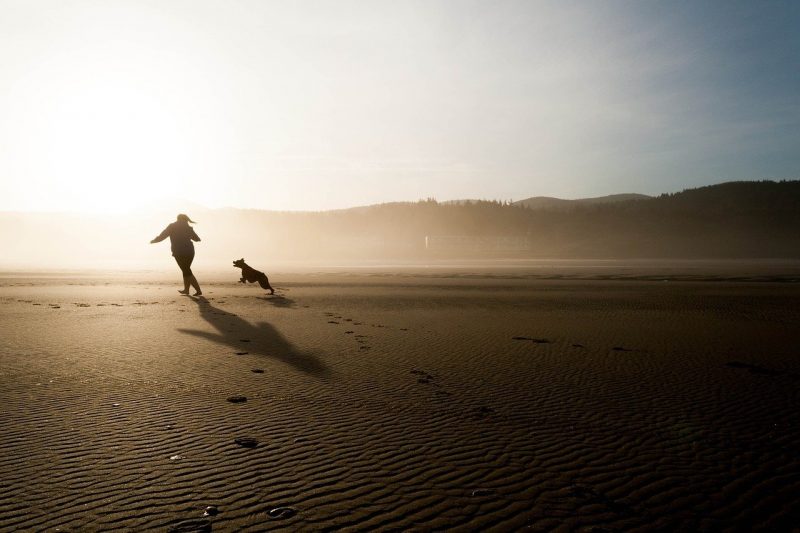
Even if their ears don’t perk up at the thought of a car ride, take them anyway if you can get them out of the house. Depressed dogs still need fresh air and sunshine, and this can help their depression.
Take them for a quick ride in the car. Head over to the dog park even if they just want to lay there. Put their leash on for a walk around the block. Offer treats if that’s what it takes.
Time
It’s common for dogs to have bouts of depression following significant changes, but it’s pretty uncommon for a dog to have long term depression unless a person or animal they were extremely close to passed away.
Your dog might just need some extra time to adjust to their new home life.
How Should I Handle A Barking Dog With A Newborn?
You just got the baby to sleep, and the dog wakes her right back up with a loud bark. It can be frustrating, but simply soothe your little one back to sleep and let the dog bark.
As children hear the noise more, they will get used to it and simply fall back asleep or sleep right through it. If this isn’t an option for you, place the dog in the other room while the baby is asleep or invest in a dog collar.
These aren’t ideal because children will have to get used to dogs at some point, but it can offer some relief.
Babies and dogs can be the best of friends, but it’s important to make sure that they adjust well to each other so that they can form a special bond.
Make sure that you introduce your dog properly, handle any issues your dog might have, and make sure your furry friend doesn’t develop severe depression.






